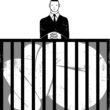Mayberry GOP—The 2002 Alabama gubernatorial election included the plot elements of a bad Southern Gothic: a Klan rally in the backwoods; a political operative stealing the opposition’s signs and planting them at the rally; a lawyer stalking and photographing the operative; incriminating photos used to extort a political candidate; and a cabal of lawyers maneuvering a man into the courtroom of a judge who promised to “hang” the defendant. There was even a prosecutor “messing up” the case to see that the defendant made it to the gallows.
What reads like a script written for Fred Thompson sent former Democratic governor Don Siegelman to jail for eighty-eight months, eliminating the politician Alabama Republicans called the “golden child” of state politics. The story pivots on two politicized U.S. Attorneys put in office by President Bush and former White House senior aide Karl Rove, before Rove retired and returned to Texas. Unlike the account of the firing of nine U.S. Attorneys, which exposed former Attorney General Alberto Gonzales’s partisan zeal and utter incompetence, this story features U.S. Attorneys who remain in office. It also suggests that Rove played a critical and questionable role in Siegelman’s prosecution.
The former governor is serving time for appointing former HealthSouth CEO Richard Scrushy to a medical licensing board after accepting a $500,000 contribution Scrushy made to a political fund the governor was using in his public campaign to legalize gambling in the state.
The story is laid out in the deposition of Jill Simpson, an Alabama attorney who worked on the campaign of Bob Riley, the Republican who defeated Siegelman in the 2002 governor’s race. While working for the Riley campaign, Simpson followed a lawyer supporting Siegelman, who was then the incumbent, to a November 2002 KKK rally and photographed the lawyer planting stolen Bob Riley campaign signs. When Simpson delivered the photos to the Riley campaign, she was told they would be used to force Siegelman to concede the race. What a lawyer for the Riley campaign told Simpson motivated her to file an affidavit with the Alabama Bar Association. In mid-September, Simpson expanded on her affidavit, in a sworn deposition before House Judiciary Committee attorneys.
Simpson testified that a Riley campaign lawyer said Siegelman would be told the photos would be released if he didn’t concede. If the release of photos of one of his supporters planting stolen signs at a Klan rally wasn’t enough to drive Siegelman out of Alabama politics, he would be prosecuted under federal charges.
Simpson also described a conference call in which Bob Riley’s son Rob Riley argued that the photos should be turned over to the press to ensure that Siegelman would be so badly damaged that he would have to give up politics. Bill Canary, a Republican Party official in Alabama was also on the conference call. According to Simpson, Canary said involving the press wouldn’t be necessary: “His girls” would take care of Siegelman. Canary’s girls were U.S. Attorneys Leura Canary (his wife) and Alice Martin, both appointed by Bush. According to Simpson’s affidavit, they would see that Siegelman was prosecuted. In Washington, Karl Rove, then at the White House, had “spoken to the Justice Department” about pursuing Don Siegelman. The case would be filed in district Judge Mark Fuller’s court.
Simpson said Rob Riley told her that federal judge Fuller was also a federal contractor, whose company had fuel and clothing contracts with the Navy and the Air Force. Bush had appointed Fuller to the federal bench. Fuller, Riley said, would “hang Don Siegelman.”
Everything Simpson was told came to pass, suggesting that Don Siegelman’s conviction was pre-scripted and pre-ordained. Scott Horton, who writes the Harper’s No Comment blog, helped move the Siegelman case onto the hearing agenda of the House Judiciary Committee. After postponing one meeting, Committee chair John Conyers (D-MI) held a hearing on October 23. The first hearing should be a prelude to document demands at the Justice Department, the White House, the Alabama U.S. Attorneys’ offices, and the office of Judge Fuller. Siegelman has denied all allegations against him, calling them fabrications. The White House, speaking on Rove’s behalf, has denied that Rove interfered at the DOJ. Judge Fuller did not respond to our questions. Only one party, Jill Simpson, has told the story under oath, facing the prospect of prosecution for perjury.






0 Comments